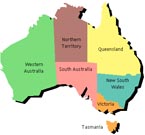Australian country town rolls out a welcome
 Lockhart, Australia - - A million Australians live abroad and get teary-eyed listening to John Williamson's songs about cattle, kangaroos, cowboys and koalas.
Lockhart, Australia - - A million Australians live abroad and get teary-eyed listening to John Williamson's songs about cattle, kangaroos, cowboys and koalas.
"A lot of people still think I'm mainly successful in the bush, but I'm mainly successful in the cities," the nation's troubadour said. "City people do love to hear about their country now."
Williamson wows audiences in London, New York, Singapore and Tokyo with ballads about life on the land in places like Lockhart, a grain- growing town 530 kilometres south-west of Sydney.
Lockhart's population is around 1,000, the same as in 1910. Nearby Wagga Wagga has grown like topsy in that time.
Nobody commutes from Wagga Wagga to Lockhart, but weekdays about a dozen Lockhart folk take the 45-minute drive to jobs in their nearest city.
Jean Gooden, a Lockhart councillor, is a reluctant commuter. "The drought means I had to take an outside job and leave Roger to run the farm," she said. "We're just hanging on until it rains and we get a crop off."
Gooden is a leading light in the Spirit of the Land festival that in October each year peps up the place with street parties, art contests, tourist trails and music concerts.
Melbourne is also only around 500 kilometres away - a skip and a jump in Australian terms - and the sort of people who can hum along to John Williamson songs come to Lockhart for the Friday horse-racing carnival and for the festival weekend.
"This all started with the drought in 2002," said Marie van Steyn, chief organizer of the festival. "This is dust and dirt and the families are fourth and fifth generation farmers."
Not so much about jetting in a new income stream from tourism, or bringing the plight of farming folk to city people, the festival is about lifting the spirits of the locals at a time of hardship. It gives locals an occasion to come together, share stories and reassure each other that there have been year-on-year droughts before and the town has survived.
Bob Kose remembers the drought of 1943 when he was forced out of school and onto the farm. "They sent down a train loaded with pumpkins from Queensland and my job was to split them open with an axe," he said. "The sheep were so hungry, and I was so small, they kept knocking me down to get to the pumpkins."
For the Picnic Races the locals get dressed in their finest, the silk in the cocktail dresses mirroring the silk on the backs of the jockeys.
"Ten years ago, the farmers around here were millionaires, but the drought - bad harvest after bad harvest - has done for a lot of them," said air-conditioning contractor Chas Bayer. "But people think 'What the heck!' and they come to the races to have a break. They realize they like life on the land. They go on."
There are paintings of puppies in the art contest, but the high- end is what's called agricultural art: sculptures made of metal scrounged from old and new implements. The winner this year was a sheep-shearing scene fashioned from corrugated iron sheets.
"Most of the artists are farmers," van Steyn explained. For some, it could be therapy.
On the Saturday night, the main street is closed for a party, a stage set up outside the Commercial Hotel and a bouncy castle inflated to keep the children entertained.
The headline act this year was Peter Denehy, who sang songs about rainfall, dung beetles and adolescent angst.
There were can-can dancers done up as though they were in the Moulin Rouge. The local chemist revealed a trained voice with a song from Les Miserables.
Time hasn't stood still in Lockhart. Dotted among the cake stalls and the pie stands were tables laid with Egyptian stuffed vine leaves, Cantonese noodles and Lebanese pita bread.
The mayor's wife was there, looking a million dollars in orange leather stilettos picked up for a song on a shopping trip to Bangkok. (dpa)